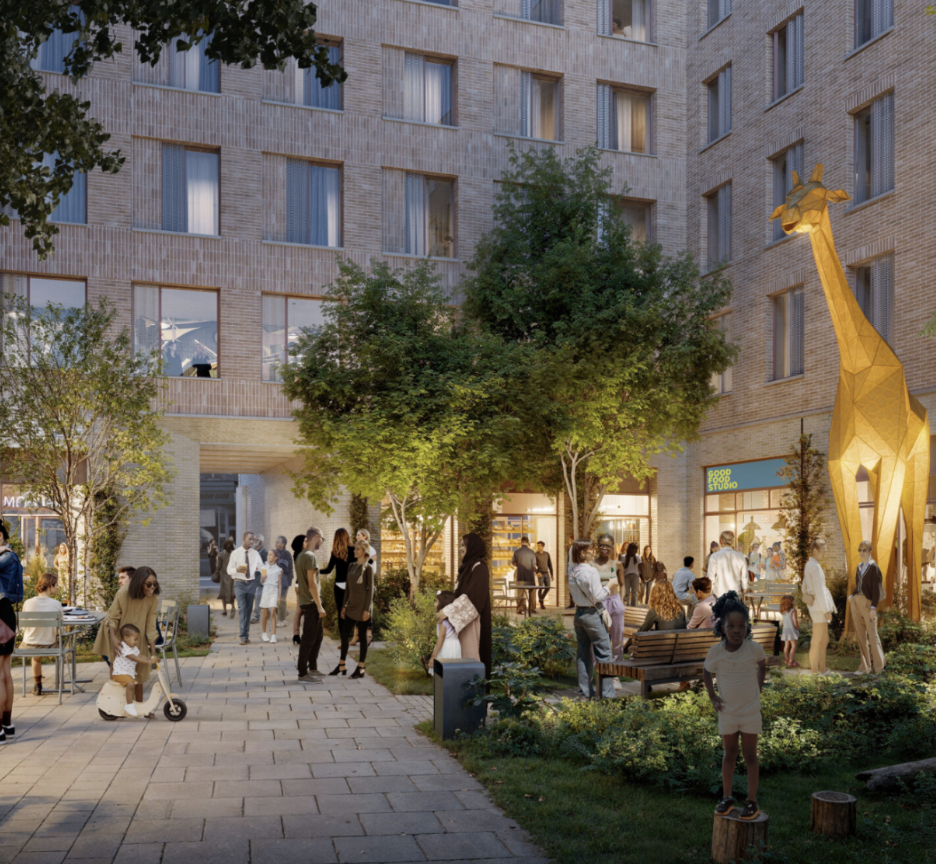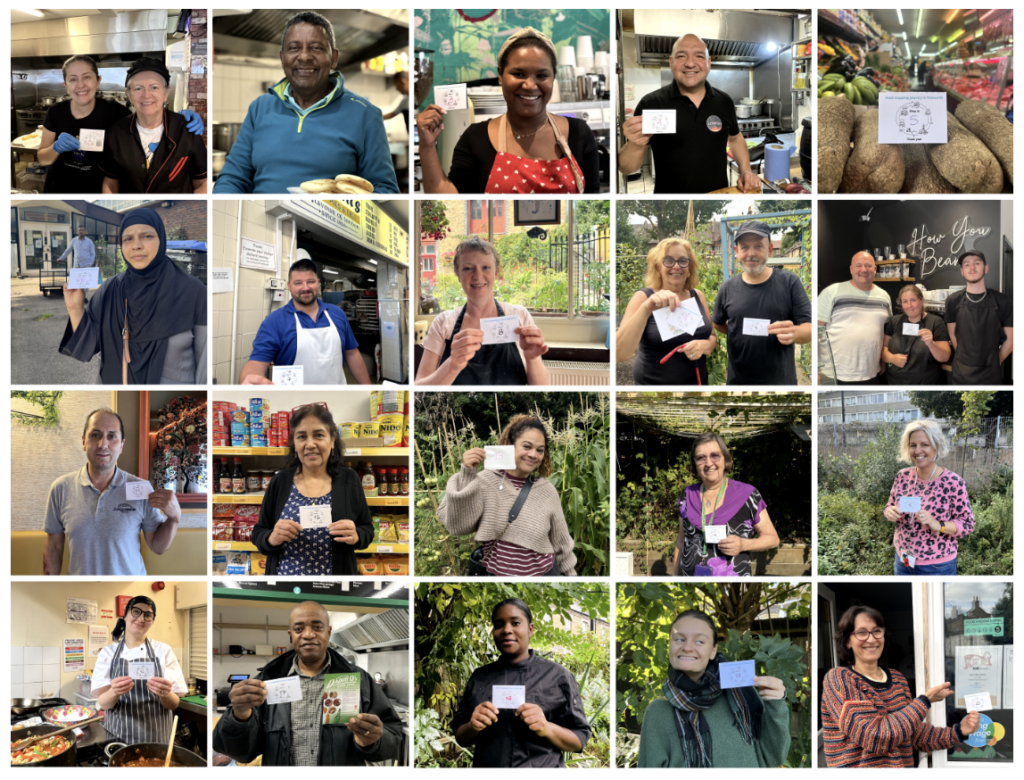Our Neighbourhood Opportunity
A high-street home for the Walworth Neighbourhood Food Model
We have a unique opportunity to develop a pioneering, high street space on Walworth Road as part of a new mixed retail and residential development by award-winning social investment and development company Fabrix. Our ambition is to celebrate Walworth’s cultural and culinary diversity, offering a platform for local food businesses and residents to engage in cultural exchange, entrepreneurship and education through food.

Opportunities like this are good but not new; community food organisations have secured good deals from developers before. We could set this space up as a community kitchen and cafe. But we believe that isn’t enough. If this space is to serve, rather than compete against, the network of local food producers, we need to bring practical and financial benefits to the neighbourhood.
Walworth is changing
Walworth is being reshaped by rising land values as three major regeneration projects are bringing sweeping changes: a new shopping centre and mixed-use development at Elephant & Castle, a new opportunity area at Old Kent Road, and the ongoing regeneration of the Aylesbury Estate. All of this change is having a detrimental impact on the local food system. Many existing businesses are struggling in the face of rising rents, displaced customers and escalating costs.
In London, 99% of food is imported and 87% of grocery expenditure is at large retailers with ‘just-in-time’ supply chains
Like the developments that are reshaping Walworth, the food system is structured by flows of money and goods that are global in their reach but that have disruptive local effects. The current food system is rooted in unsustainable practices, exchanges and supply chains that are increasingly vulnerable to climate disasters, price shocks and geopolitical changes; this is particularly true in cities like London where 99% of food is imported and 87% of grocery expenditure is at large retailers with ‘just-in-time’ supply chains (ReLondon, Food Footprint).
Through the WNFM we are moving beyond short-term solutions to coordinate action between residents, community-groups, businesses and policy-makers to build a resilient local food system.
Building a Co-operative
Starting with the local restauranteurs and business owners in our network, we aim to develop a cooperative ownership and governance structure for the site, bringing direct financial benefits to members both on-site sales and growing new customer bases for existing operations.

From here, we will explore and build collaborative governance and ownership models for the Neighbourhood Food Model more broadly – establishing formal trading partnerships that bring people that grow, cook, supply and consume food locally into direct and mutually beneficial relationships. There are many successful models of multi-stakeholder food cooperatives for us to learn from, including Fifth Season Cooperative and Weaver Street Market the U.S..
A Collaborative Approach
Building on deep local relationships, we are forming an ambitious alliance to build a just and resilient food system that moves beyond short-term solutions and food handouts to coordinate action between residents, community-groups, businesses and policy-makers to build a local food system that:
- Campaigns for and builds collective food security
- Facilitates access to and stewardship of food justice and climate action
- Generates and keeps money in Walworth
- Capitalises on the power of good food to bring people of very different backgrounds together
- Connects local action with regional and national climate agendas.
So far our alliance includes:
Walworth Community Organisations
Local businesses are central to the Walworth Neighbourhood Food Model’s direction, including what we focus on, how we deliver projects and what success looks like. Our Mapping Project has built a network of local food producers, growers and cooks, coming together, sharing challenges and building collaborative opportunities.
Southwark Council – Climate, Public Health and Local Economy teams
We are collaborating with councillors from Faraday, North Walworth and Newington as well as three Southwark Council teams to take a cross-sector approach food system transformation.
Fabrix
A multi-award winning development and investment company, specialising in breathing life and bringing value to underutilised and overlooked urban spaces. They deliver placemaking through applying the highest standards of design and environmental performance, underpinned by a commitment to shaping a more sustainable and equitable world.
Small Axe
A non-profit campaigning organisation, inspiring people to act on the most pressing issues of our time.
We Go Forth, First Hand
An event-based climate learning platform. Bringing people from outside the neighbourhood to learn from what we’re doing. We Go Forth are experts at delivering knowledge sharing events to diverse audiences, from academics and corporations to community groups.
London Doughnut Economics Coalition (LDEC)
LDEC supports the alliance with adopting better, fairer and regenerative approaches to its economy and impact measurement. Their premise is that every person in London should be entitled to a minimum standard of living (social foundation) and that the city needs to operate within defined environmental limits (ecological ceiling).
Learn a little more below
Funding
Our aim is a sustainable-blended model that capitalises on the opportunity that the high street location provides for revenue generation. Grant funding will be necessary for the set-up phases including capacity building, training and skills development, testing our operations model, establishing the community business customer base and supporting community governance. Over time we aim to build growth in income from sales and reduce dependency on grant funding.
We will also look at funding opportunities that include, but are not limited to: community share funding, corporate funding, and social investment.
This is matched by a substantial contribution from the developer Fabrix for both fit-out costs and a long (25 year) lease at peppercorn rent.
Impact Measurement
London Doughnut Economics Coalition (LDEC), with support from Impact on Urban Health, is developing a range of work streams to understand where they can have the biggest impact in London. They include a focus on neighbourhoods, high streets and food systems.
LDEC is now working in partnership with us to build a framework for measuring impact and thinking differently about value on the high street. The LDEC High Streets group will develop a new value framework and theory of change for the Walworth Road site. They will use Doughnut Economics to challenge traditional notions of value on the high street, elevating social and ecological considerations and focussing on the role that food and new food systems can play in supporting community cohesion, better health and local wealth retention while reducing the environmental impact of food.
Pembroke House Assets and Knowledge
We are building on Pembroke House’s experience since 2019 as a convener of alliances and collaborations in the neighbourhood including:
- Walworth Group
22 local organisations brought together to work collaboratively on community development inc. building a Social Regeneration Charter for Walworth. - Walworth Emergency Food Hub
Set-up of referrals, hub operations and full delivery system, working with 40 local referral partners including schools, hostels, housing officers, mutual aid groups, faith groups and Tenants and Residents Associations, coordinating 400 local cycle volunteers to deliver over 340,000 food parcels over 18 months.. - We Walworth
Co-lead with Southwark Council, hosting Neighbourhood Welcome events and on street engagements. Holding equitable spaces in Working Groups for local residents to work together side-by-side with representatives from central gov, local gov and local organisations, tackling local food-related challenges at East St Market, and Burgess Park. - Neighbourhood Food Model (ongoing)
Taking a systemic approach to food at a local level. inc. an Action Learning Group for local orgs working with surplus food, bringing together local food growers sharing challenges and opportunities, running food tours, a community chef pilot, and building connections between food growers, business owners and food lovers through food mapping and food sharing events.
We have lots to learn from existing community efforts
We are building on and learning from extensive community food and wealth projects around the world that have demonstrated what is possible including:
Weaver Street Market, U.S.A
Fifth Season Cooperative
The Preston Model, UK
The REKO model, Scandinavia
The Nordic Cookbook for Systems Change
We have an evolving library of resources for the Walworth Neighbourhood Food model that can be found here.